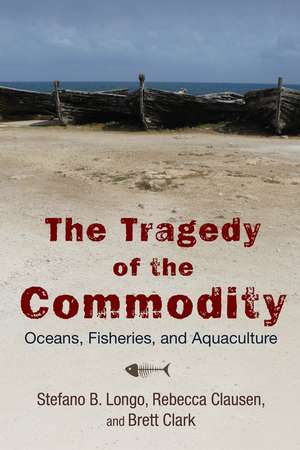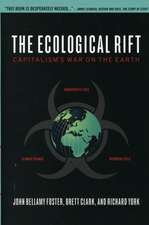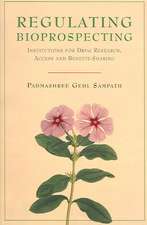The Tragedy of the Commodity: Oceans, Fisheries, and Aquaculture: Nature, Society, and Culture
Autor Stefano B. Longo, Rebecca Clausen, Brett Clarken Limba Engleză Paperback – 25 iun 2015
Winner of the 2017 Paul Sweezy Marxist Sociology Book Award from the American Sociological Association
Although humans have long depended on oceans and aquatic ecosystems for sustenance and trade, only recently has human influence on these resources dramatically increased, transforming and undermining oceanic environments throughout the world. Marine ecosystems are in a crisis that is global in scope, rapid in pace, and colossal in scale. In The Tragedy of the Commodity, sociologists Stefano B. Longo, Rebecca Clausen, and Brett Clark explore the role human influence plays in this crisis, highlighting the social and economic forces that are at the heart of this looming ecological problem.
Although humans have long depended on oceans and aquatic ecosystems for sustenance and trade, only recently has human influence on these resources dramatically increased, transforming and undermining oceanic environments throughout the world. Marine ecosystems are in a crisis that is global in scope, rapid in pace, and colossal in scale. In The Tragedy of the Commodity, sociologists Stefano B. Longo, Rebecca Clausen, and Brett Clark explore the role human influence plays in this crisis, highlighting the social and economic forces that are at the heart of this looming ecological problem.
In a critique of the classic theory “the tragedy of the commons” by ecologist Garrett Hardin, the authors move beyond simplistic explanations—such as unrestrained self-interest or population growth—to argue that it is the commodification of aquatic resources that leads to the depletion of fisheries and the development of environmentally suspect means of aquaculture. To illustrate this argument, the book features two fascinating case studies—the thousand-year history of the bluefin tuna fishery in the Mediterranean and the massive Pacific salmon fishery. Longo, Clausen, and Clark describe how new fishing technologies, transformations in ships and storage capacities, and the expansion of seafood markets combined to alter radically and permanently these crucial ecosystems. In doing so, the authors underscore how the particular organization of social production contributes to ecological degradation and an increase in the pressures placed upon the ocean. The authors highlight the historical, political, economic, and cultural forces that shape how we interact with the larger biophysical world.
A path-breaking analysis of overfishing, The Tragedy of the Commodity yields insight into issues such as deforestation, biodiversity loss, pollution, and climate change.
| Toate formatele și edițiile | Preț | Express |
|---|---|---|
| Paperback (1) | 316.45 lei 6-8 săpt. | |
| Rutgers University Press – 25 iun 2015 | 316.45 lei 6-8 săpt. | |
| Hardback (1) | 828.54 lei 6-8 săpt. | |
| Rutgers University Press – 25 iun 2015 | 828.54 lei 6-8 săpt. |
Preț: 316.45 lei
Nou
Puncte Express: 475
Preț estimativ în valută:
60.55€ • 63.39$ • 50.10£
60.55€ • 63.39$ • 50.10£
Carte tipărită la comandă
Livrare economică 05-19 aprilie
Preluare comenzi: 021 569.72.76
Specificații
ISBN-13: 9780813565774
ISBN-10: 0813565774
Pagini: 274
Ilustrații: 11 photographs, 5 figures, 2 m
Dimensiuni: 152 x 229 x 18 mm
Greutate: 0.4 kg
Ediția:None
Editura: Rutgers University Press
Colecția Rutgers University Press
Seria Nature, Society, and Culture
ISBN-10: 0813565774
Pagini: 274
Ilustrații: 11 photographs, 5 figures, 2 m
Dimensiuni: 152 x 229 x 18 mm
Greutate: 0.4 kg
Ediția:None
Editura: Rutgers University Press
Colecția Rutgers University Press
Seria Nature, Society, and Culture
Notă biografică
STEFANO B. LONGO is an assistant professor of sociology at North Carolina State University at Raleigh.
REBECCA CLAUSEN is an associate professor of sociology at Fort Lewis College in Durango, Colorado.
BRETT CLARK is an associate professor of sociology at the University of Utah in Salt Lake City and the author or co-author of three books, including The Ecological Rift.
Cuprins
Preface
1 Sea Change
2 Human Ecology, Social Metabolism, and the Tragedy of the Commodity
3 Managing a Tragedy
4 From Tuna Traps to Ranches
5 From Salmon Fisheries to Farms
6 A Sea of Commodities
7 Healing the Rifts
Notes
Index
Recenzii
"Impressive and compelling. The historical, political, and ecological perspectives? offered in The Tragedy of the Commodity are vital to understanding the link between the 'tragedy' inherent in many 'common property' situations."
"The Tragedy of the Commodity is a timely, readable, comprehensive, and critical guide to what is wrong with our relationship with the sea and its creatures and what can be done to recreate this necessary relationship. A must read for anyone interested in knowing what is wrong with our relationship with the sea and how to go about changing it for the better."
"Consider[s] some of the most brutal aspects of the effects of capitalism in the process of turning every part of nature and every aspect of people's lives within it into something salable … The Tragedy of the Commodity also makes clear that to stop this destruction our society has to be organised in a completely different way and we have relatively little time to achieve it."
"The Tragedy of the Commodity is a fantastic piece of literature that should be a staple book for graduate courses in environmental sociology."
"A crucially important contribution to the discussions on the future of our oceans and our relationship to them."
"The Tragedy of the Commodity is an important step toward situating commons governance and ecological crises within a critique of the political economy of capitalism. "
Descriere
The Tragedy of the Commodity explores the role of human agency in the overfishing crisis, highlighting the social and economic forces behind this looming ecological problem. In a critique of the classic theory “the tragedy of the commons” by ecologist Garrett Hardin, the authors argue that it is the commodification of aquatic resources that leads to the depletion of fisheries and the development of environmentally suspect means of aquaculture.
























